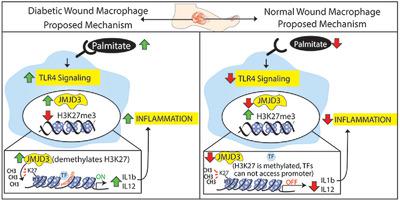当前位置:
X-MOL 学术
›
Eur. J. Immunol.
›
论文详情
Our official English website, www.x-mol.net, welcomes your feedback! (Note: you will need to create a separate account there.)
Palmitate-TLR4 signaling regulates the histone demethylase, JMJD3, in macrophages and impairs diabetic wound healing.
European Journal of Immunology ( IF 5.4 ) Pub Date : 2020-07-14 , DOI: 10.1002/eji.202048651 Frank M Davis 1 , Aaron denDekker 1 , Amrita D Joshi 1 , Sonya J Wolf 1 , Christopher Audu 1 , William J Melvin 1 , Kevin Mangum 1 , Mary O Riordan 2 , Steven L Kunkel 3 , Katherine A Gallagher 1, 2
European Journal of Immunology ( IF 5.4 ) Pub Date : 2020-07-14 , DOI: 10.1002/eji.202048651 Frank M Davis 1 , Aaron denDekker 1 , Amrita D Joshi 1 , Sonya J Wolf 1 , Christopher Audu 1 , William J Melvin 1 , Kevin Mangum 1 , Mary O Riordan 2 , Steven L Kunkel 3 , Katherine A Gallagher 1, 2
Affiliation

|
Chronic macrophage inflammation is a hallmark of type 2 diabetes (T2D) and linked to the development of secondary diabetic complications. T2D is characterized by excess concentrations of saturated fatty acids (SFA) that activate innate immune inflammatory responses, however, mechanism(s) by which SFAs control inflammation is unknown. Using monocyte‐macrophages isolated from human blood and murine models, we demonstrate that palmitate (C16:0), the most abundant circulating SFA in T2D, increases expression of the histone demethylase, Jmjd3. Upregulation of Jmjd3 results in removal of the repressive histone methylation (H3K27me3) mark on NFκB‐mediated inflammatory gene promoters driving macrophage‐mediated inflammation. We identify that the effects of palmitate are fatty acid specific, as laurate (C12:0) does not regulate Jmjd3 and the associated inflammatory profile. Further, palmitate‐induced Jmjd3 expression is controlled via TLR4/MyD88‐dependent signaling mechanism, where genetic depletion of TLR4 (Tlr4−/−) or MyD88 (MyD88−/−) negated the palmitate‐induced changes in Jmjd3 and downstream NFκB‐induced inflammation. Pharmacological inhibition of Jmjd3 using a small molecule inhibitor (GSK‐J4) reduced macrophage inflammation and improved diabetic wound healing. Together, we conclude that palmitate contributes to the chronic Jmjd3‐mediated activation of macrophages in diabetic peripheral tissue and a histone demethylase inhibitor‐based therapy may represent a novel treatment for nonhealing diabetic wounds.
中文翻译:

Palmitate-TLR4 信号调节巨噬细胞中的组蛋白去甲基化酶 JMJD3 并损害糖尿病伤口的愈合。
慢性巨噬细胞炎症是 2 型糖尿病 (T2D) 的标志,与继发性糖尿病并发症的发生有关。T2D 的特征是饱和脂肪酸 (SFA) 浓度过高,可激活先天免疫炎症反应,然而,SFA 控制炎症的机制尚不清楚。使用从人类血液和小鼠模型中分离的单核巨噬细胞,我们证明棕榈酸酯 (C16:0) 是 T2D 中最丰富的循环 SFA,可增加组蛋白去甲基化酶 Jmjd3 的表达。Jmjd3 的上调导致 NFκB 介导的炎症基因启动子驱动巨噬细胞介导的炎症的抑制性组蛋白甲基化 (H3K27me3) 标记的去除。我们确定棕榈酸酯的作用是脂肪酸特异性的,如月桂酸酯(C12:0) 不调节 Jmjd3 和相关的炎症谱。此外,棕榈酸酯诱导的 Jmjd3 表达是通过 TLR4/MyD88 依赖的信号传导机制控制的,其中 TLR4 的基因缺失(Tlr4 -/- ) 或 MyD88 ( MyD88 -/- ) 抵消了棕榈酸酯诱导的 Jmjd3 变化和下游 NFκB 诱导的炎症。使用小分子抑制剂 (GSK-J4) 对 Jmjd3 进行药理学抑制可减少巨噬细胞炎症并改善糖尿病伤口愈合。总之,我们得出结论,棕榈酸酯有助于 Jmjd3 介导的糖尿病外周组织中巨噬细胞的慢性活化,而基于组蛋白去甲基化酶抑制剂的疗法可能代表一种治疗不愈合糖尿病伤口的新方法。
更新日期:2020-07-14
中文翻译:

Palmitate-TLR4 信号调节巨噬细胞中的组蛋白去甲基化酶 JMJD3 并损害糖尿病伤口的愈合。
慢性巨噬细胞炎症是 2 型糖尿病 (T2D) 的标志,与继发性糖尿病并发症的发生有关。T2D 的特征是饱和脂肪酸 (SFA) 浓度过高,可激活先天免疫炎症反应,然而,SFA 控制炎症的机制尚不清楚。使用从人类血液和小鼠模型中分离的单核巨噬细胞,我们证明棕榈酸酯 (C16:0) 是 T2D 中最丰富的循环 SFA,可增加组蛋白去甲基化酶 Jmjd3 的表达。Jmjd3 的上调导致 NFκB 介导的炎症基因启动子驱动巨噬细胞介导的炎症的抑制性组蛋白甲基化 (H3K27me3) 标记的去除。我们确定棕榈酸酯的作用是脂肪酸特异性的,如月桂酸酯(C12:0) 不调节 Jmjd3 和相关的炎症谱。此外,棕榈酸酯诱导的 Jmjd3 表达是通过 TLR4/MyD88 依赖的信号传导机制控制的,其中 TLR4 的基因缺失(Tlr4 -/- ) 或 MyD88 ( MyD88 -/- ) 抵消了棕榈酸酯诱导的 Jmjd3 变化和下游 NFκB 诱导的炎症。使用小分子抑制剂 (GSK-J4) 对 Jmjd3 进行药理学抑制可减少巨噬细胞炎症并改善糖尿病伤口愈合。总之,我们得出结论,棕榈酸酯有助于 Jmjd3 介导的糖尿病外周组织中巨噬细胞的慢性活化,而基于组蛋白去甲基化酶抑制剂的疗法可能代表一种治疗不愈合糖尿病伤口的新方法。



























 京公网安备 11010802027423号
京公网安备 11010802027423号